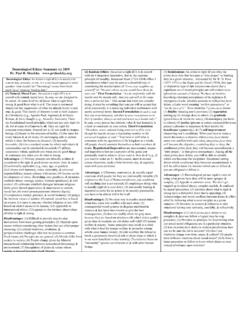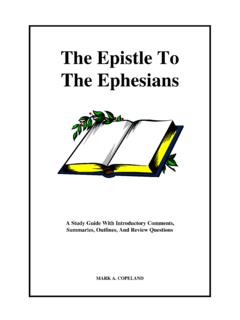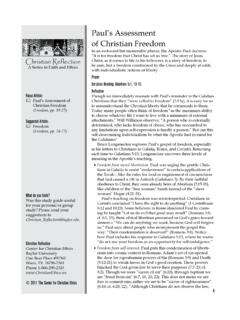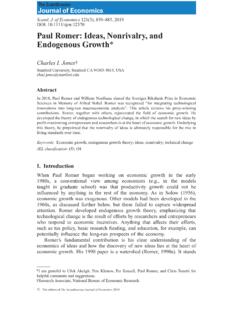Transcription of The Problem of Generations - UC Santa Barbara
1 ,however,thangivea criticalevaluationofthepresentstageofdis cussion(inPartOne);thiswillhelpusinourow nanalysisoftheproblem(inPartTwo).Twoappr oachestothcproblemhavebeenworkedoutinthe past:a'positivist'anda'romantic-historic al' ;schoolsrepresenttwoantagonistictypesofa ttitudestowardsreality, ~j~ofthePositivistsconsistedinreducingth eirproblemstoquanti-:;~tativeterms;theys oughta quantitativeformulationoffactol'li' qualitativeapproach,firmlyeschewingthecl earday,;1lightofmathematics, ;adefinit,measurablespanoflife; ,thinksthePositivist,is theframeworkofhumdestinyincomprehensible , , theultimatehumanrelationshipsarechanged, theexistenceofmanaswehavecometounderstan dit mustceasealtogether-culture,creativeness ,traditionmustalldisappear,ormustatleast appearina ,hesaid,thetypeofsuccessionofhumangenera tionstobecompletelyalteredtoresemblethat ofa butterflyorcaterpillar, ,supposemantobeofsucha highdegreeofmentaldevelopmentastobecapab leofchoosingrationallytheformofgovernmen tmostsuitableforhimself.
2 (This,ofcourse,wasthemainproblemofHume's time.)Theseconditionsgiven,hesaid,itwoul dbebothpossibleandproperforeachgeneratio n,withoutreferencetothewaysofitsancestor s, asit is-generationfollow-inggenerationinacont inuousstream,sothatwheneveronepersondies off, similaridea:hetriedtoelucidatethenaturea ndtempoofprogress(thecentralproblemofhis time) ,hesaid, ,whereastoreducethepresentdurationoflife byhalfora quarterwouldcorrespondinglyacceleratethe tempo,becausetherestrictive,conservative ,'go-slow'influenceoftheoldergenerationw ouldoperateforalongertime,shouldtheylive longer,andforashortertime, ,buttherewasalsodangerthattoogreatanacce lerationmightresultinshallowness, thebestofallpossibleworlds,Comteneverthe lessthoughtthato~rspanoflifeandtheaverag egenerationperiodofgoyearswerenecessaryc orrelativesofourorganism,andthatfurther, , (19), ,indeed.
3 Everythingiscapableofanalysisintoitscons tituentelements,theconstructiveimaginati onofthethinkercelebratesitstriumph;byfre elycombiningtheavailabledata,hehassuccee dedingraspingtheultimate,constantelement sofhumanexistence, a directcontinuationofclassicalrationalism , , ,Cournot, ,Mentre,andothersoutsideGermanyarepositi vists'or,atanyrate, ,theItalian, ,theAustrianhistorian,allworkedata timewhenthepositivistwaveencompassedallE urope.! generallawtoexpresstherhythmof historicaldevelopment,basedonthebiologic allawof thelimitedlife-span-ofmanan~ , ,everything,sofaraspossible,wassimplifie d:aschematicpsychologyprovidedthatthepar entsshouldalwaysbea , ,afterthissimpli-fication,appearstobetof indtheaverageperiodoftimetakenfortheolde rgenerationtobesupersededbythenewinpubli clife,andprincipally,tofindthenaturalsta rting-pointinhistoryfromwhichtoreckona generationis veryvariouslyestimated-manyassessingit at15years( ),butmosttakingit tomean30years,onthegroundthatduringthefi rst30yearsoflifepeoplearestilllearning, ,andthatat60a it 'sattemptseemstobethemostscientific;hetr iedtoassessgenera-tionperiodsinvariousna tions, , (whichvaryasbetweenbothsocialgroupsandco untries).
4 Germanywascomputedat36t, ,becausebirthanddeathinsocietyasa wholefollowcontinuouslyoneupontheother, , ,whofirstreviewedtheproblemhistoric-ally ,placedthewholeformulationona discussionofthesamephenomenonamonganimal s,basedontheworkofEspinas('LesSocietesAn imales',Paris,I8n).It is onlyafterhavinginvestigatedtheseelementa ryaspectsoftheproblemthathetakesupmoreco mplexaspects, refinementoftheproblemduetoMentrewhichfl owsfromthedistinctionhemakes(incommonwit hLevy-Bruhl)between'institutions'and'ser ieslibres'.Arhythminthesequenceofgenerat ionsisfarmoreapparentintherealmofthe'ser ies'-freehumangroupingssuchassalonsandli terarycircles-thanintherealmoftheinstitu tionswhichforthemostpartlaydowna lastingpatternofbehaviour,eitherbyprescr iptionsorbytheorganizationofcollectiveun der-takings, whathecallsapre-eminentsphereinhistory(f orexample,politics,science,law,art,econo mics,etc.)
5 Nosuchdominantsphereimposingitsownrhythm ofdevelop-mentupontheothers,sinceallalik eareembeddedinthegeneralstreamofhistory, 'sbookisusefulasthefirstcomprehensivesur veyoftheproblem,althoughinrealityityield slittle,consideringitsvolume, ' (19), problemextendingfaroutsidetheacademicfie ld,a problemwhoseimpactuponreallifecouldbeobs ervedinconcretefashion,forexample, purelyquantitativeapproach,wemayconsider himasa quitedifferentatmosphereif ,dependingondominantpoliticaltrends, ,whoattackedtheproblemfromthestatistical viewpoint, ,whousedgenealogicalresearchdataashissta rting-point,bothremainedfaithfultC' 'German' 'swork;inDiltheywewitnessthesuddenre-eme rgence,inrevisedform,ofproblemsandcatego rieswhichintheiroriginal, , positivisttypeofthought,derivingdirectly fromthetraditionoftheEnlightenment, , , (I),Bainville(3),Ageorges(2),Valois(30).
6 (7),andPlatz(25), ,thepositionwasjustthereverse-theromanti candhistoricalschoolssupportedbya :theculturalscienceswerebasedentirelyont heromantic-historicalattitude,andpositiv ismgainedgroundonlysporadically, ,itisnever-thelesstruethatit providedrallyingpointsinthestrugglewhich wasconductedroundpracticallyeverylogical category; ,wecannothopetounderstandit ,especiallyathome,asstated,inFrance, ,arisingoutofmodemliberalimpulses,fromth eoutsetadopteda mechanistic,extemalisedconceptoftime,and attemptedtouseit t isthisconceptofprogress,ontheotherhand,t hatischallengedbytheromanticandhistorici stGermanmindwhich,relyingondatafurnished bya conservativetechniqueofobserva-tion,poin tstotheproblemofgenerationspreciselyasev idenceagainsttheconceptofunilineardevelo pmentinhistory.
7 !Theproblemofgenerationsis ' ,asheputsit,theadoptionofthe'generation' asatemporalunitofthehistoryofintellectua levolutionmakesit possibletoreplacesuchpurelyexternalunits 1 Fortheconservativeconceptoftime,cf.'Cons ervativeThought',tobepublishedina repudiationoftheconceptofprogressasusedt osumuphistoricaldevelopment, ,Pindt'r(23), ,months,years,decades,etc.,bya conceptofmeasureoperatingfromwithin(eine voninnenabmessendeVorstellung).Theuseofg enerationsasunitsmakesit possibletoappraiseintellectualmovementsb yanintuitiveprocessofre-enactment)Thesec ondconclusiontowhichDiltheycomesinconnec tionwiththephenomenonofgenerationsisthat notmerelyisthesuccessionofoneafteranothe rimportant, ,social,andpoliticalcircumstancesareexpe riencedbycontemporaryindividuals,bothint heirearly,formative, ,theyconstituteonegeneration, ,fromthepointofviewofthehistoryofideas,c ontemporaneitymeansastateofbeingsubjecte dtosimilarinfluencesratherthanamerechron ologicaldatum,shiftsthediscussio!
8 Lfroma planeonwhichit riskeddegeneratingintoa ,a problemopentoquantitative,mathematicaltr eatmentonlyisreplacedbya qualitativeone,centredaboutthenotionofso methingwhichis notquantifiable,but~ )lseparatinggenerationsbecomessubjective lyexperienceabletime;andcontemporaneityb ecomesasubjectiveconditionofhavingbeensu bmittedtothesamedetermininginfll, is onlyonesteptothephenomenologicalposition ofHeidegger,whogivesa veryprofoundinterpretationofthisqualitat iverelationship-forhim,theverystuffandsu bstanceofFate.'Fateis notthesumofindividualdestinies, ,andtheconsequentpreparednessfora distinctsetofpossibilities, 'sgenerationcompletesthefulldramaofindiv idualhumanexistence.
9 '2 Thequalitativeconceptoftimeuponwhich,asw ehaveseen,Dilthey'sapproachwasbased, (8), (12), (23), , ,ontheotherhand, ,butdoesnotknowhowtoavoidthenaturalexces sesofromanticism.'Thenon-contemporaneity ofthecontemporaneous' theonlyrealtime,theymustallinfactbelivin ginqualitativelyquitedifferentsubjective eras.'Everyoneliveswithpeopleofthesamean dofdifferentages,witha "sametime"is a differenttime-thatis,itrepresentsa differentperiodofhisself,whichhecanonlys harewithpeopleofhisownage.'1 Everymomentoftimeis thereforeinrealitymorethana point-likeevent-itis a temporalvolumehavingmorethanonedimen-sio n, :thethinkingofeachepochis , 'entelechy'ofitsownbywhichmeansaloneit canreallybecomea generationtoexistinthecommunityofdeter-m ininginfluencesofanintellectualandsocial kind,thelinkofcontemporaneityassuchdidno tassumea 'fate'astheprimaryfactorproducingunity;P inder,then,inthetraditionofmodernarthist ory,suggestedtheconceptof'entelechy'.
10 Accordingtohim,theentelechyofa generationis theexpressionoftheunityofits'inneraim' ,thisconceptof'entelechy'representsthetr ansferofRiegl'sconceptofthe'artmotive'(K unstwollen)3fromthephenom-enonofunityofa rtisticstylestothatoftheunityofgeneratio ns,inthesamewayastheconceptofthe'artmoti ve'itselfresultedfromtherejuvenationandf ructification,undertheinfluenceofpositiv ism,ofthemorphologicaltendencyalreadyinh erentinthehistoricistconceptofthe'Spirit ofa people'(Volksgeist).1 Pinder(23), ' , ,'OntheInterpretationofWeltanschauung,' 'spiritoftheage'(Zeitgeist)withwhichoneh adhithertoprincipallyworked,nowturnsoutt obe-totakeanotherofPinder'sfavourite1mus icalanalogies-anaccidentalchord,anappare ntharmony,producedbytheverticalcoinciden ceofnoteswhichinfactowea primaryhorizontalallegiancetothedifferen tparts( )ofa ( ).







